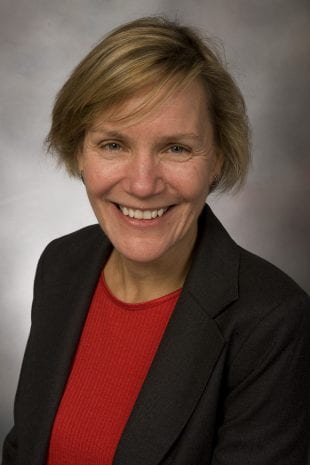Jeff Falk
713-348-6775
jfalk@rice.edu
Jade Boyd
713-348-6778
jadeboyd@rice.edu
Janet Braam named interim dean of natural sciences
Peter Rossky stepping down after six years to focus on research
HOUSTON — (April 29, 2020) — Rice University bioscientist Janet Braam has been appointed interim dean of the Wiess School of Natural Sciences.
Braam, the Wiess Professor of Biochemistry and Cell Biology and chair of Rice’s Department of BioSciences, will take over July 1 from Peter Rossky, who’s stepping down to focus on research.
Braam will complete her 13th year as a department chair June 30. She has chaired BioSciences since its 2014 founding through the merger of the departments of Biochemistry and Cell Biology and Ecology and Evolutionary Biology. She chaired Biochemistry and Cell Biology from 2007-14.
“Janet is an outstanding teacher and scholar and has shown exceptional leadership as chair of the Department of BioSciences,” said incoming provost Reginald DesRoches. “I look forward to working with her as interim dean of natural sciences.”
“I’m honored to be asked to step in during this transition,” Braam said via a Zoom interview. “A top priority will be to bring the faculty of the school together to develop strategies to keep moving forward with both research and teaching during this challenging time.”
Rice transitioned to online-only classes and closed nonessential labs and offices in March to limit the spread of COVID-19. Like most of her colleagues, Braam is working from home. She said she’s looking forward to returning to campus and working with DesRoches, who has served as the William and Stephanie Sick Dean of Engineering since 2017 and will become provost July 1.
“It’s hard to be too reassuring right now because there are many questions and few answers, but I’m looking forward to working with the faculty of the school to get through this, and I think Reggie is going to be an excellent provost,” Braam said. “His experience at Rice will be helpful to hit the ground running.”
Braam joined Rice in 1990. She received her Ph.D. in molecular virology and biology from the Sloan-Kettering Division of the Cornell Graduate School of Medical Sciences. Her research focuses on cellular and genetic mechanisms plants use to sense and respond to the environment. In humans, similar mechanisms play a role in aging, cancer and neurodegenerative disease.
Braam is a fellow of the American Association for the Advancement of Science and the American Society of Plant Biology. She received a 2017 Women in Science with Excellence Award from BioHouston and the 2012 Cozzarelli Prize from the Proceedings of the National Academy of Sciences.
“Janet is a great choice for interim dean,” Rossky said. “She has a lot of experience as chair of one of the largest departments on campus, which puts her in a very good position to serve as interim dean.”
Rossky said he’s looking forward to returning to research. In reflecting on his time as dean, he said he is most proud of faculty hiring.
“The success rate we’ve had and the quality of the people we’ve been able to hire is comparable to any other university,” Rossky said. “We have also advanced diversity. We’ve hired about half women and a substantial number of people from other underrepresented groups.”
The search for a permanent dean has begun. The search committee is chaired by Peter Rodriguez, dean of Rice’s Jones Graduate School of Business.
-30-
High-resolution IMAGES are available for download at:
https://news2.rice.edu/files/2020/04/0428_BRAAM-interim-lg.jpg
CAPTION: Janet Braam (Photo by Jeff Fitlow/Rice University)
This release can be found online at news.rice.edu.
Follow Rice News and Media Relations via Twitter @RiceUNews.
Located on a 300-acre forested campus in Houston, Rice University is consistently ranked among the nation’s top 20 universities by U.S. News & World Report. Rice has highly respected schools of Architecture, Business, Continuing Studies, Engineering, Humanities, Music, Natural Sciences and Social Sciences and is home to the Baker Institute for Public Policy. With 3,962 undergraduates and 3,027 graduate students, Rice’s undergraduate student-to-faculty ratio is just under 6-to-1. Its residential college system builds close-knit communities and lifelong friendships, just one reason why Rice is ranked No. 1 for lots of race/class interaction and No. 4 for quality of life by the Princeton Review. Rice is also rated as a best value among private universities by Kiplinger’s Personal Finance.


